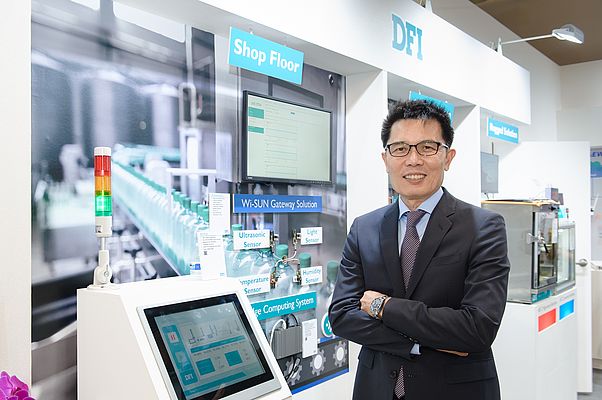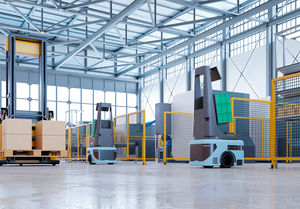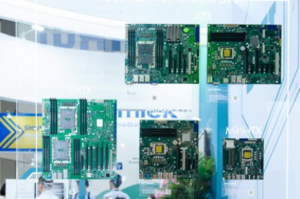Interview number 6 of our virtual round table: Steven Tsai, President at DFI
IEN Europe: What lessons can corporations learn from the successful handling of the Covid-19 Pandemic?
S. Tsai: The simple answer to that is to have a robust risk management process that factors in every conceivable risk, including outbreaks. As many countries in Asia have learned since the 2002-2003 SARS Epidemic, whether we like it or not, outbreaks are an inevitable part of our existence. They can pop up at any time, and without much warning, and have the potential to bring companies and industries to a standstill. For DFI, its emphasis on strict risk management has allowed it to soften the blow from the Covid-19 Pandemic, namely in terms of its manufacturing operations. Even before the pandemic, DFI had begun to diversify its manufacturing footprint by bringing capacity back to Taiwan from China.
With support from the Qisda Group, DFI also strengthened the company’s versatility by moving a small number of production lines to Vietnam. While this diversification was mainly implemented in response to US-China trade tensions, it also had the benefit of cushioning DFI from the impact of the initial outbreak in China. Whether in anticipation of a trade war, financial crises, or infectious disease outbreak, it is always prudent to know your risks and plan for them accordingly.
IEN Europe: How has DFI reacted to the crisis and what actions have been taken? Both internally and externally.
S. Tsai: DFI has reacted to the Covid-19 Pandemic as it would with any other major catastrophe or crisis. We took a holistic approach to reviewing and reacting to the impact of the pandemic on our operations and made adjustments accordingly. However, what makes the Covid-19 Pandemic different from other catastrophes or crises is its sheer longevity and unpredictability. While outbreaks are factored into our risk assessment process, the scale and scope of the current pandemic is unprecedented in terms of duration and severity. As a result, we have had to evaluate the situation continually and remain hyper-vigilant.
To date we have made many numerous adjustments to our operations to meet the “new normal.” Among them include optimizing our resource management process and operations. These encompass improving internal work and communication processes to optimize transparency and communications. They also include ensuring operational and financial resilience, such as lowering inventories, conserving cash resources, cancelling attendance at tradeshows to ensure employees’ health. DFI also upgraded its IT systems to support remote work operations and permit flexible modes of working according to local circumstances in the United States, Japan, Netherlands, and mainland China.
DFI also took steps to safeguard the health of its nearly 800 employees, including the implementation of travel restrictions, the strengthening of preventive and hygiene practices, as well as routinely communicating with our colleagues at different manufacturing facilities to stay abreast of the situation.
IEN Europe: What is DFI’s point of view on mega trends in the industrial market? How are you preparing for them?
S. Tsai: While the pandemic has wreaked havoc on industries and economies alike, the industrial mega trends that we have been monitoring, such as automation, AI, IoT, and datafication seem to being continuing their momentum, and in many cases are moving forward with increased impetus. A great example is the healthcare sector, where big data and AI have proven to be an important tool in battling Coivd-19. Whatever the future holds, the megatrends that we have pinpointed are no longer just trends, but realities of the 21st century economy. We have been preparing for this for quite some time by investing in R&D to meet the needs of what many people are calling the second industrial revolution.
Recently, DFI has seen a rise in orders for telephone and video systems as well as infrared sensing applications. DFI forecasts that market demand will contract and probably not return to levels seen before the crisis. However, upon the acceleration of the Covid-19 Pandemic, DFI quickly focused on business segments that would likely thrive in a post-Covid-19 world, including medical (ultrasound and thermal imaging), smart automation, and transportation (in-vehicle solutions).
IEN Europe: What can we learn from the current crisis in building a more resilient world, society, and economy?
S. Tsai: In general, this pandemic has reinforced the importance of transparency as well as clarity and speed of communications. As we have seen, in a matter of months, the coronavirus has spread to every corner of the planet with immense speed. From the initial outbreak in China to the spread of the coronavirus to Europe, and later North America, the importance of transparency has never been more crucial. Transparency helps to build relationships, fosters cooperation, and ensures people have the information they need to make the right decisions. Very much related to this is clear and timely communication. Being transparent is not enough in itself. The right information has to be delivered to the right people at the right time for it have the most impact.
On the corporate side, transparency and communication also apply. Whether it is with partners, suppliers, employees, or shareholders, all of a company’s stakeholders must be on the same page to ensure a concerted effort towards achieving a common objective, whether that be reaching a sales target, rolling out innovations, or safeguarding the health and wellbeing of employees. However, just as important as transparency and communications is adaptability and diversification. Adaptability meaning companies need to be prepared for change and have the flexibility to adjust their operations based on internal or external factors. Diversification also ties in closely with adaptability as it gives companies more options and the breathing space to address uncertainty and volatility.
IEN Europe: Are you focusing more on product innovation or on service innovation?
S. Tsai: In our world today, the differentiation between hardware and services are blurring. Therefore, we do not see ourselves solely in terms of products or services. Both things need to come together to have a competitive and meaningful offer. We are a provider of industrial solutions that help customers optimize their equipment to ensure maximum productivity, durability, and longevity. We serve a wide breadth of segments and applications including factory automation, healthcare, gaming, transportation, smart energy, mission-critical, and intelligent retail.
DFI’s core competencies encompass six key areas:
- In the era of IoT, everything will be connected, therefore we must think about how products can allow customers to carry out system integration in a flexible manner. The needs of IoT applications are diverse and complex. One of the restrictions in the field is that users need to choose between performance and size. In response to this, DFI offers a series of miniaturized boards and systems to let integrators of IoT applications have more flexibility in performance options.
- Another common limitation encountered in the field is temperature. The industry-standard temperature specifications currently defined can no longer meet the needs of many fields. DFI is the first IPC manufacturer in the industry to introduce a stricter temperature standard. All DFI standard products can withstand temperatures from -5 degrees to 65 degrees, a major improvement over the current standard of 0 to 60 degrees.
- The use of AI in deep learning technologies continue to develop by leaps and bounds. It also stimulates industrial applications in various fields as a catalyst for integrating AI. The current mainstream AI technology is based on image-oriented deep learning. Therefore, the demand for GPU computing power is constantly increasing. In response to the the growing reach of AI, edge computing is integrating different levels of AI to meet the applications of various fields. Therefore, hardware platforms with applications will develop in a diversified direction according to demand.
- In order to allow developers of these applications to find suitable hardware for different applications more easily, DFI provides many entry-level miniaturized motherboards and systems with AI computing capabilities as well as miniaturized motherboard system for desktop platforms for mid-range applications. Many motherboard product lines have been added to allow developers to more easily install high-end graphics cards, from small motherboards with a single MXM graphics card to a compact integrated system with a single PCIe high-end graphics card. We also provide server-type motherboards that support multiple PCIe graphics cards that can be applied to high-end visual inspection platforms and artificial intelligence in the cloud.
- The cost of IC design, development and manufacturing continues to increase due to the continuous evolution of the wafer process. In the future, there will be more restrictions on the choice of ICs for special functions to complement the small and diverse development features of IPC. DFI has set up a dedicated FPGA R&D team to help meet the needs of customers.
- With the arrival of the 5G era, DFI is ready to play a crucial role in helping customers upgrade their capabilities. DFI is in a great position to do this with synergies with its sister companies in the Qisda Group, including ALPHA Networks and AEWIN. What’s more, DFI can also leverage its synergies with partners from within the BenQ Business Solutions Alliance to provide customer with end-to-end solutions for capturing opportunities in the era of 5G.
IEN Europe: How has this crisis affected your business? How will it affect your business in the long term?
S. Tsai: Typically, the first half of the year is our busiest, and the pandemic has no doubt affected us. During 1Q, the outbreak and lockdown in China occurred. In 2Q, the subsequent outbreaks in Europe and the US transpired. As with companies the world over, we cannot forecast with certainty what the future will hold as the pandemic still casts a shadow over the world and governments continue to remain cautious about removing restrictions. Regardless, as DFI’s supply chain and production capabilities remain stable, we are ready to handle customer orders when they come in.
Apparently, this pandemic will also increase the growth of segments such as 5G, AI, and the Internet of Things, and enterprises in the mist of a digital transformation. These segments won’t disappear but will be redistributed.
IEN Europe: Which markets have been affected the most in your opinion?
S. Tsai: Industries that rely heavily on human interactions and oversight have been most affected by the pandemic. For example, retail, transportation, and construction to name a few. In terms of our customer base, the gaming industry (casino/POS/Infotainment) has been quite severely affected, as with other businesses deemed to be non-essential.
IEN Europe: What can governments do to help companies and industries rebound from the crisis?
S. Tsai: Firstly, the priority of governments is to address the public health crisis and ensure the welfare of its citizens. While we would like to see a rapid rebound on the economic and business front, the health and safety of people are paramount. However, governments should undertake certain actions, if they haven’t already, to help soften the economic fallout from the coronavirus. These may include the provision of unemployment support and interest-free loans to businesses that have been hardest hit. On the other hand, governments should not merely react to the economic fallout from Covid-19, but also be proactive in preparing businesses for the post-Covid-19 recovery, such as supporting new emerging areas of the economy, like 5G and AI. In addition, governments should assist startups and enterprises in enhancing the skills of current employees and the unemployed as well as fund infrastructure upgrades.
IEN Europe: What is your outlook on the manufacturing industry going forward? Will there be a swift recovery or a gradual one?
S. Tsai: There are many factors in play in regards to this issue. Among them is demand for products and services, which have been negatively affected by travel restrictions and stay-at-home orders. While we are beginning to see restrictions being lifted, governments are doing so with a lot of trepidation and doing it in a gradual manner. What’s more, the lifting of restrictions are by no means uniform around the world, with some countries permitting the gradual opening of factories, while others are still in a state of lockdown. The state of the manufacturing industry will depend on market demands. If orders continue to remain at the levels we see now, some factories will face closures. Only time will tell how the manufacturing sector will look like in the near and long terms.
IEN Europe: How do you fill the gap left by the absence of tradeshows and industry events in regards to generating leads and building new relationships?
S. Tsai: Without the ability to engage with our stakeholders in person, we have been relying on online tools to ensure that we continue to remain visible and have touchpoints. These tools include online seminars and events, ecommerce platforms, search engine optimization, and influencer marketing.
IEN Europe: What opportunities do you see emerging from the current crisis for the industrial sector?
S. Tsai: We don’t see new opportunities emerging per say, but we do see previously identified emerging opportunities coming on much faster than before. For example, smart manufacturing and automation. The pandemic has exposed a number of weaknesses for many manufacturers; including problems arising out of not have diversified manufacturing footprints, supply chains, and labor sources.
IEN Europe: What challenges do you see facing the technology sector?
S. Tsai: As with other sectors, the pandemic poses a monumental challenge to the technology sector. The most obvious of them is the effects of social distancing. With in-person human interactions out of the question for the moment, we and our peers and clients are turning to technology to overcome this obstacle. That includes relying on video conferencing software or remote technologies to control and monitor systems. In terms of disease control applications, technology is also stepping up to the plate.
For example, in major transportation facilities, such as airports and train stations, where there are multiple entrances, Centralized Smart Thermal Control Systems are being implemented to help detect people with fevers and allow health authorities to take timely and appropiate actions. Unfortunately, technology is not a cure all for everything and many things still require a human touch, such as product validation and testing among others.
Industry research institute, his, pointed out that in the five years from 2017 to 2022, the global industrial computer market value will show a compound annual growth rate of 4.1%, and will reach a global output value of $ 4.3 billion by 2022. Many smart devices are highly customized after they are connected to the cloud, and can be used in industrial automation and intelligence, cloud computing, smart medical treatment, data collection, communication and networking, etc. according to the needs of different industries. In addition, the Industrial Internet of Things will help improve the sustainable development of the industry, reduce operating costs, and increase productivity. It will also affect the industry, value chain, business model, and labor developments in the next ten years. These trends will bring huge industrial computer application opportunities.
Sara Ibrahim



















